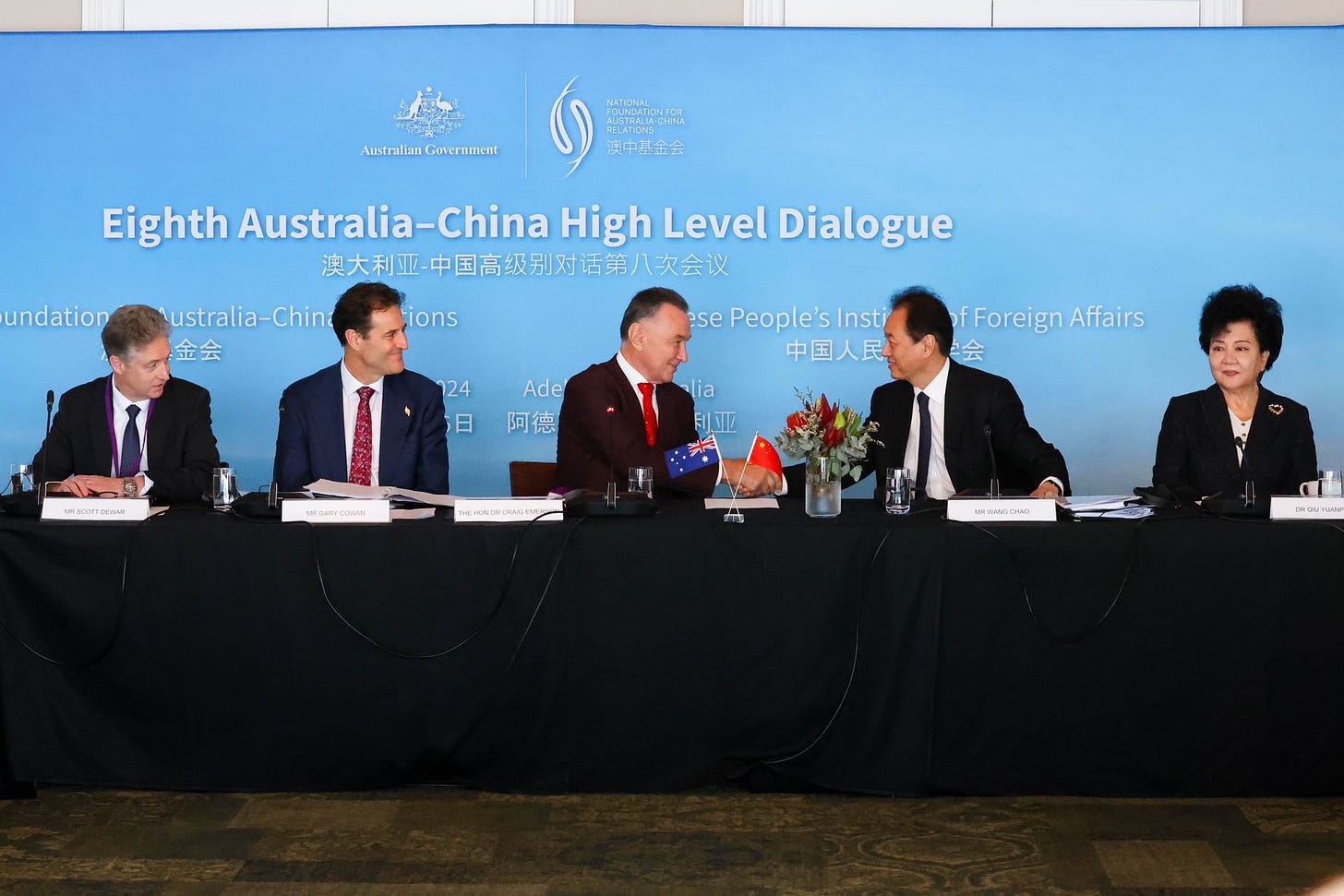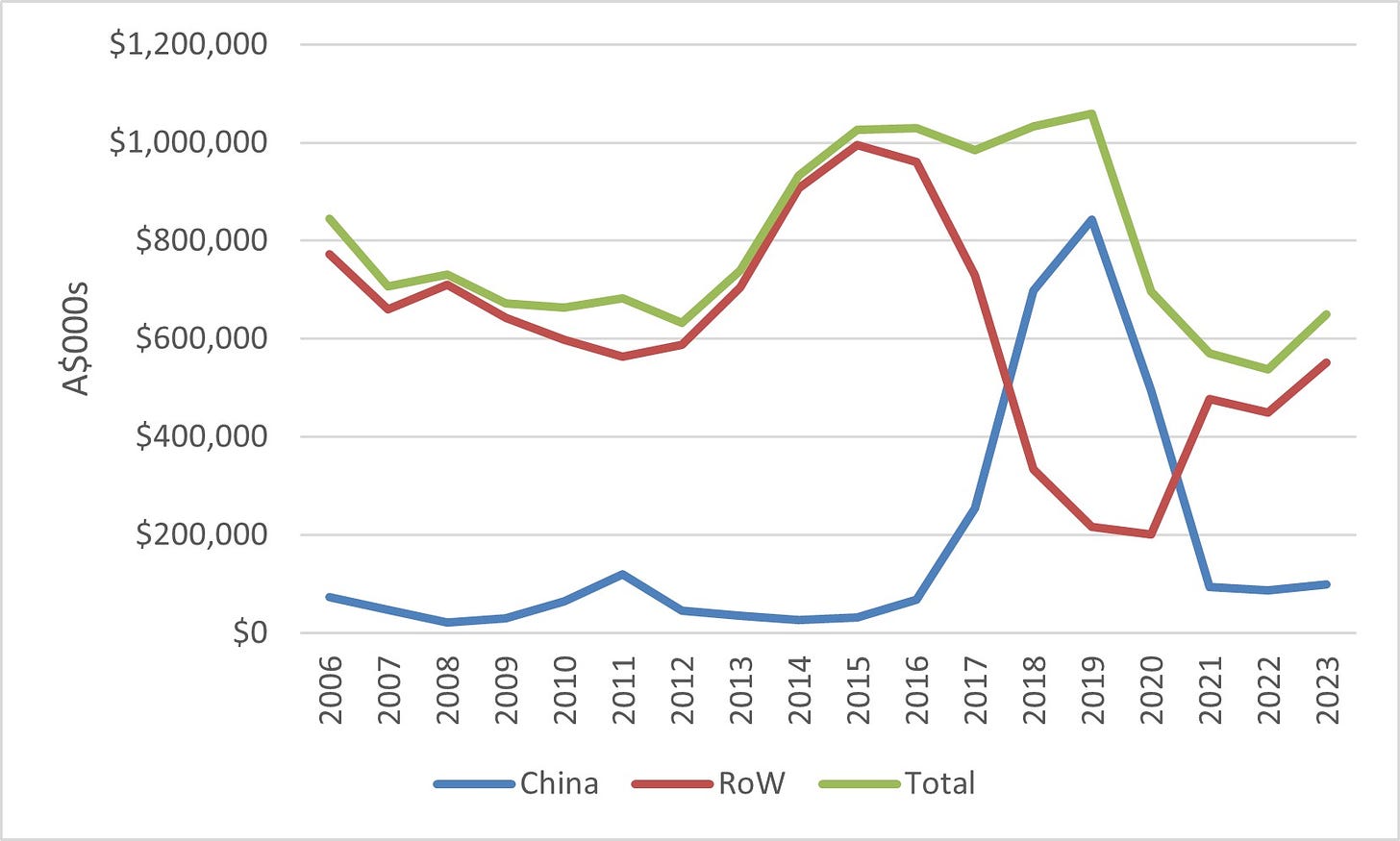Enduring economic coercion, live lobster costs, and possible quid pro quo pressure
Weeks of 29 July to 18 August 2024
Given the reduced tempo of major Australia-China developments, the free edition of BCB will likely move to a slower publication rhythm for the next few months (probably one newsletter every 3-4 weeks). The format and style will remain the same.
Paid subscribers will continue to receive regular quick updates on breaking bilateral stories. An edition of BCB in Brief will go out to paid subscribers later today on last night’s Senate urgency motion on Taiwan.
Stubborn live lobster trade restrictions
The Chinese Ministry of Foreign Affairs Spokesperson discussing Australia-China trade ties on 2 August 2024:
“China stands ready to … make the pie of mutually beneficial [bilateral] cooperation bigger, and deliver more benefits to the two peoples.”
Quick take:
China’s Ambassador in Canberra, its consul generals in Melbourne, Brisbane, and Perth, and its state-controlled press have all been busy spruiking the benefits of deeper bilateral trade ties. But despite all this upbeat messaging, Prime Minister Anthony Albanese’s hope in June that the trade barriers on live lobster would be removed “very soon” remains unrealised. After a conspicuous gap of ministerial mentions of China’s remaining trade restrictions, Minister for Foreign Affairs Penny Wong said on 16 August at the 8th Australia-China High Level Dialogue that she was “confident that our friends from the agriculture sector would have reiterated our case for the lifting of remaining impediments on live lobster and red meat establishments.”
Minister Wong is no doubt right. And on top of that industry advocacy, the state governments representing the biggest lobster fishing regions are almost certainly also making the case for the removal of those trade restrictions. I’d imagine, for example, that this issue was a big part of the discussion in late July when South Australia’s Minister for Trade and Investment met the Chinese Consul General in Adelaide. Yet notwithstanding all that lobbying and the Albanese government’s past confidence about the impending demise of the biggest remaining trade barrier, China still hasn’t relented.
Large losses for the lobster industry
The annual value of Australia’s crustacean exports (principally lobster) to China, the rest of the world, and total, 2006 to 2023:
Quick take:
As well as being an impediment to the progressive repair of bilateral ties, China’s ongoing trade restrictions against Australian live lobster are causing enduring pain for exporters. Following a sustained rise in the total annual value of crustacean exports in the early 2010s, a peak of more than $1 billion was reached in 2019. This all-time high came on the back of the surge in value of this export to the Chinese market after the China-Australia Free Trade Agreement (ChAFTA) entered into force in 2015. Among the many other benefits for Australian exporters, ChAFTA saw tariffs on lobster incrementally lowered between 2015 and 2018, and removed entirely by the start of 2019.
The value of this export then collapsed from 2020 onwards as sales to China nosedived following Beijing’s imposition of coercive economic measures against Australian live lobster in November that year. The value of crustacean exports to China hasn’t recovered since, with only a modest increase in the total value of this export in 2023. The average total annual value of this export in the three years after China imposed trade restrictions was roughly $400 million less than the average total annual value in the three years before Beijing began its campaign of economic coercion.
Based on those numbers, China’s trade restrictions against Australian live lobster might have caused the cumulative loss of circa $1.85 billion worth of revenue between November 2020 and June 2024. That figure is consistent with the industry estimates that I’ve seen of the total lost revenue in approximately the same period. This number is admittedly a ballpark approximation based on the assumption that, among other things, the value of crustacean exports to China wouldn’t have dropped dramatically without Beijing’s economic coercion. But even if the figure of $1.85 billion in lost revenue isn’t beyond debate, there’s no doubt that China’s trade restrictions on live lobster have imposed massive and long-lasting costs on Australian exporters.
A live lobster quid pro quo?
The Chinese Ministry of Commerce Spokesperson as quoted by Xinhua on 22 October 2023:
“China and Australia have reached consensus in terms of properly settling disputes of common concern, including the ones concerning wine and wind towers.”
Quick take:
China’s enduring trade restrictions on Australian live lobster are puzzling given recent bilateral relationship repair on a range of other fronts. The simplest explanation might be that they’re still on track to be removed, pending ongoing working-level negotiations between Australia’s Department of Agriculture, Fisheries and Forestry and the General Administration of Customs China. If that’s the case, then it’s possible that these live lobster trade restrictions will go soon once these discussions wrap up. Though, of course, it’s necessary to add the caveat that it might still be unclear to even the relevant Australian and Chinese officials when exactly these negotiations will conclude.
However, it’s equally possible that Beijing is using the biggest remaining trade restriction as a tool of leverage and/or punishment. China might be pushing Australia to, for example, unwind some of its anti-dumping measures on Chinese products like stainless steel sinks, laminate glass, and silicon metal before removing the trade restrictions on live lobster. Or China might have left the trade barriers on live lobster in place as retribution for Australia’s July decision to continue anti-dumping measures against certain railway wheels exported from China. Depending on how Canberra responds to Beijing’s possible quid pro quo request and/or punishment, the trade restrictions on live lobster might last much longer than the Albanese government previously expected.
The public might never know the real reason for China’s enduring trade barriers on live lobster. But if the Albanese government has been pressured to make concessions to secure the removal of these trade restrictions, then it’s possible we’ll see some coordinated compromises in the coming weeks/months. Canberra might make a decision that dovetails with Beijing’s interests and provides China with cover to remove the trade barriers on live lobster. For example, Australia’s anti-dumping measures on hollow structural sections (here and here) might be discontinued around the same time that Beijing just so happens to determine that the supposed cadmium issues with Australian live lobster have been resolved. This would roughly mirror the pattern in October 2023 when the announcement of a process for the removal of China’s wine duties came days after the release of preliminary findings from Australia’s Anti-Dumping Commission (ADC) recommending that measures on Chinese wind towers expire.
To be clear, it doesn’t ipso facto follow that the Albanese government is interfering in the work of the ADC even if a recommendation to remove some anti-dumping measures coincides with China deciding to dismantle its trade restrictions on live lobster. The ADC in such a scenario might make its recommendation unmoved by the Albanese government’s priority of getting the trade barriers on live lobster lifted. The concurrent timing might just be happenstance that conveniently gives China the face-saving off-ramp it wants.
That said, Canberra might still be tempted to offer up something like the removal of anti-dumping measures on hollow structural sections to persuade Beijing to relent with its live lobster trade restrictions. Given that the next milestone for the two hollow structural sections cases is the final report, which could drop in the next few months, the sequencing and timing might broadly work to secure the de facto end of China’s economic coercion campaign before the federal election late this year or early next year. Added to that, the fact that those anti-dumping measures were also imposed on hollow structural sections from South Korea, Taiwan, and Malaysia means that their removal is less likely be seen as a concession to China specifically. This might make their removal a less politically contentious way for Canberra to entice Beijing to end the trade barriers on live lobster.
I’m not at all confident that something akin to the above is what’s actually happening. And I’m certainly not necessarily advocating this or a similar course of action for Canberra. But this kind of explanation at least has a whiff of plausibility to it. All that said, I’m clearly now drifting off into the speculative realm, so I’ll stop here. Especially because it’s entirely possible that China will remove the live lobster trade restrictions tomorrow and all this prognosticating will be moot.
As always, thank you for reading, and please excuse any errors (typographical or otherwise). Any and all objections, criticisms, and corrections are very much appreciated.






We threw out lot in with the manichean, moronic US elite to cripple China's (the global majority's in general) power in the world. Don't yet see any Australian drawdown of the burgeoning US military presence yet. Seems we're good with it! 👍
China doesn't trust us because, like Germany, Poland etc, we are US vassal states with no autonomy, no dignity.
Our ruling layers know they've rooted us - our economic future, but will not deal with this most substantive issue. The lobsters are an indicator of the permanent diet we've put ourselves on.
China deals with nations who know their own interests and don't gaslight. The US, a busted flush of a power, will be fine. Its vassals????
Nah!
The public might never know the real reason for China’s enduring trade barriers on live lobster?
If the ABC and the Australian Government have anything to say about it, we will never know why they slapped us in the first place.
Our refusal to publish the Chinese Embassy's letter of concern, let alone discuss it as requested, is boorish and shortsighted, like America's foreign policies.